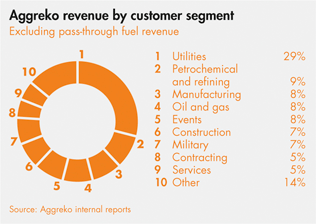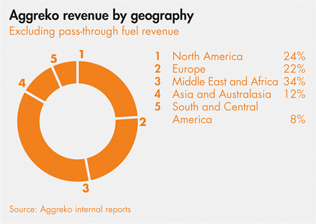Our Business Models
Aggreko is organised around two different business models
Local business
Our Local business is a high transaction volume business, renting equipment to enable customers to respond quickly to requirements for power and temperature control; the average contract size is around £3,000, but the range is from £200 to over £1,000,000. Although most of this business has a lead-time of more than 12 hours, about 25% of its revenues come from responding to emergencies. It is therefore essential to have the capability to deploy equipment and people to the customer’s site within a matter of hours. This business operates from 133 service centres in Europe, North, Central & South America, the Middle East, Asia and Australasia. These service centres look after customers who are normally within a radius of 150 miles and they offer the complete range of our products and services.
In 2008, the Local business had revenues of £580 million which is 67% of Aggreko's total revenue excluding pass-through fuel1.
International Power Projects
The International Power Projects business sells power which we deliver using temporary power plants owned and operated by ourselves. Whereas in the Local business a contract with a customer is described in terms of renting specified items of equipment for a period of time, most of the contracts that International Power Projects perform are for providing a defined amount of electrical power. Under the terms of these contracts, Aggreko is responsible for installing and operating the equipment and the invoice to the customer is for power generation capacity not equipment rented. Most projects in this business are worth over £1 million and some can be worth over £10 million a year. 65% of revenues comes from power utilities in developing countries but we also serve governments, armed forces, international agencies as well as oil and mining companies. A typical contract in this business would be for the rental of 20-50MW for an initial period of 6-9 months, which will often be extended. We use standardised equipment: 1MW containerised units of our own design assembled in our own factory in Scotland. These generators use either diesel or gas and are designed specifically to be easily transportable, reliable and robust. Power projects can arise anywhere in the world and the required response time is generally weeks or months rather than the hours or days needed in the Local business. To support these projects we concentrate our fleet in a number of hubs – in South America, Europe, the Middle East and Asia. From each hub, large amounts of equipment can be shipped or flown rapidly to wherever it is needed.
In 2008, our International Power Projects business generated revenues of £281 million, or 33% of Aggreko's total revenue excluding pass-through fuel revenue1.
Who are our customers?
Aggreko serves every industry that uses power and temperature control, making our customer-base very diverse, both in terms of geography and market segment. This is a great advantage, as it gives us some protection against problems in any one particular market. And we can quickly move resources to sectors and countries which are growing.


Competitive environment
Our biggest competitors are not rental companies, but equipment manufacturers. When customers need equipment, they have the choice to buy, lease or to rent. The vast majority of chillers and generators supplied to end-users each year are bought or leased, and only a few are rented. So, in terms of pricing and service, we always have to be focused on the fact that customers have a choice, not only of using other rental companies, but also to buy from manufacturers.
Within the Local business, barriers to entry are low; many companies, small and large, drift in and out of rental, and competition in each market is fierce. Typically, competitors in the Local business are either privately-owned specialist rental businesses, or divisions of large plant-hire companies. Most of them operate in a single country, and often in just a particular part of a country. In each region, local competition is intense but the competitors will tend to be different country by country.
In International Power Projects we also see localised competition, often from the local distributors of manufacturers or from entrepreneurs. However, these companies find it hard to organise across territories, and it is difficult to operate efficiently in this business without a large fleet and the infrastructure to sell and operate it around the world.
In both the Local business and International Power Projects valuable economies of scale accrue to those who can operate on a global basis. However, to gain these benefits of global scale requires a long-term commitment to building distribution, deep technical expertise across a number of disciplines, and a well- developed supply-chain; it also requires hundreds of millions of pounds of capital to fund fleet investment. Over the last ten years, some very powerful companies such as GE, Alstom and Caterpillar have tried to emulate Aggreko, but none have been willing to match Aggreko's rate of investment in fleet, people and global distribution. As a consequence, we have grown to be significantly larger than any other company operating in our market.
1 Pass-through fuel revenue relates to contracts in our International Power Projects business in Sri Lanka and Uganda where we provide fuel on a pass-through basis.

